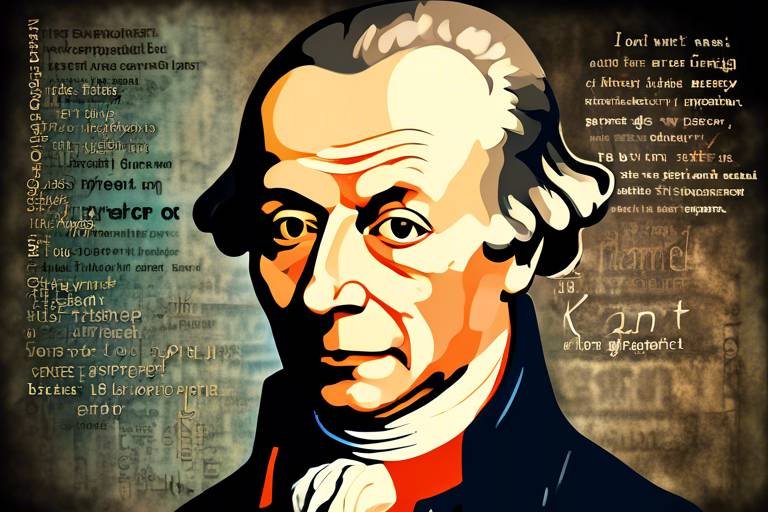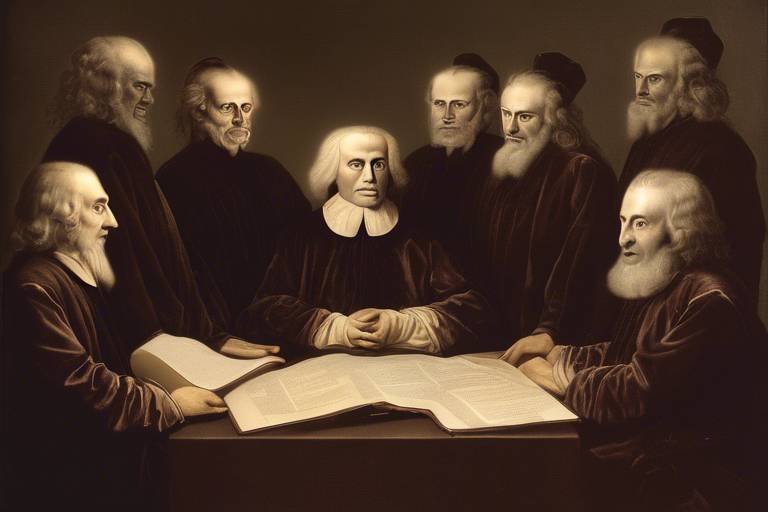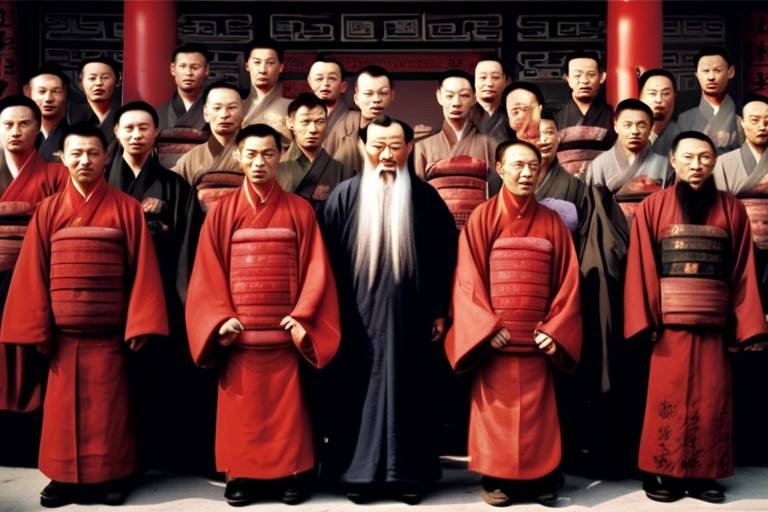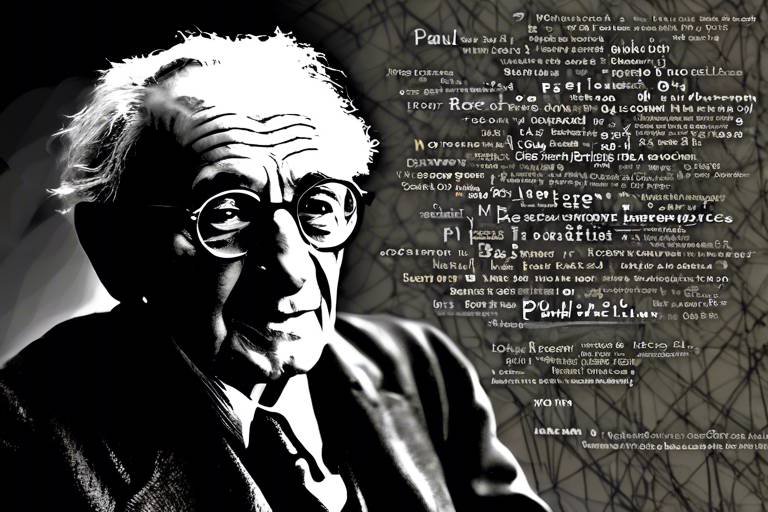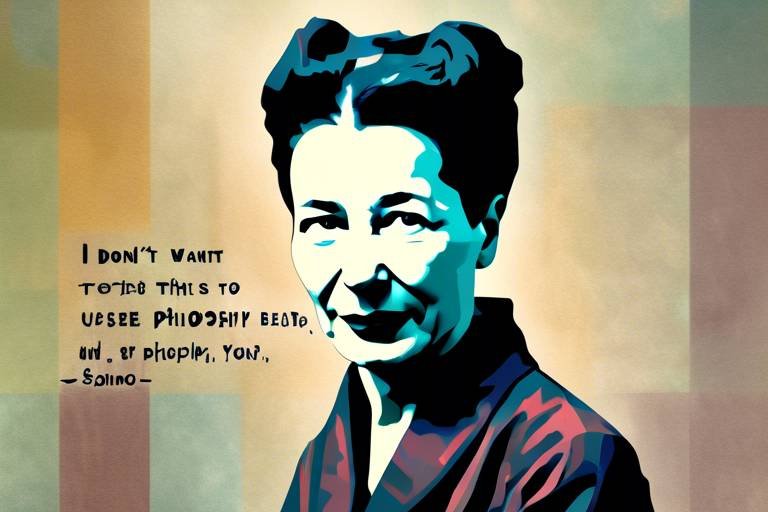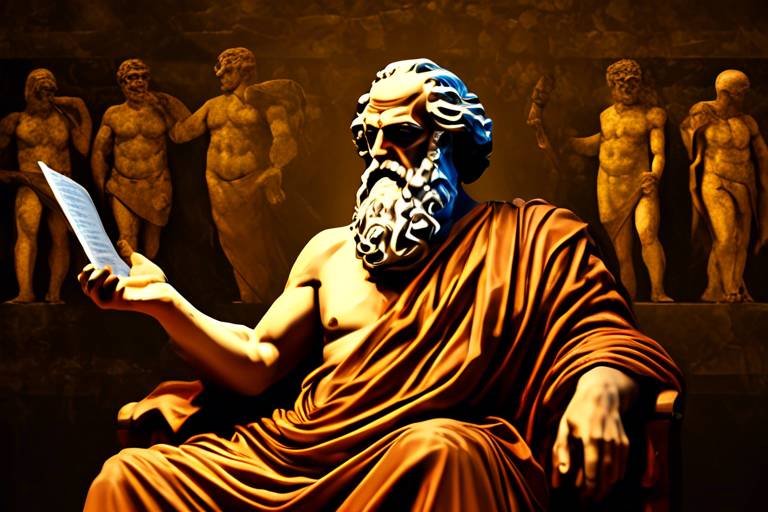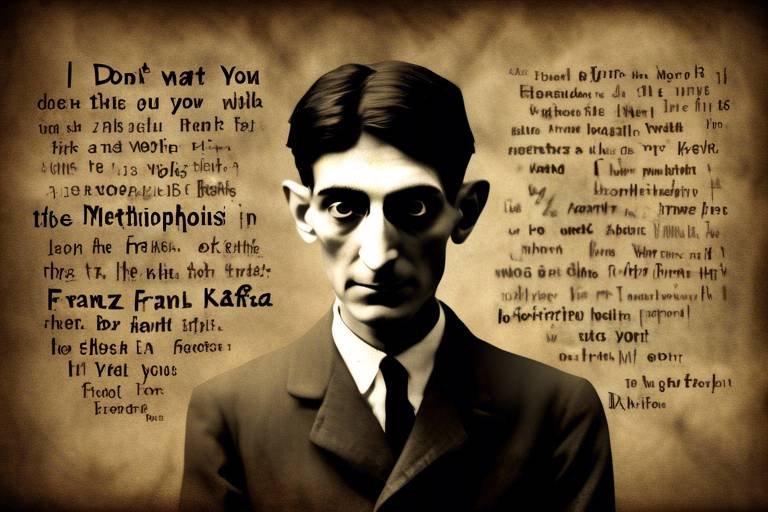Key Theories From Philosopher Immanuel Kant
Immanuel Kant, a towering figure in Western philosophy, has left an indelible mark on how we think about knowledge, ethics, and aesthetics. His theories challenge us to reconsider the very nature of reality, morality, and beauty. In this article, we will delve into Kant's fundamental theories, exploring the intricate web he weaved between metaphysics, ethics, and epistemology. By examining his ideas, we not only gain insight into his profound impact on modern philosophy but also discover how his thoughts continue to resonate in contemporary discussions.
One of the most significant contributions Kant made was his theory of Transcendental Idealism. This concept posits that our experience of reality is not merely a passive reception of sensory data but is actively shaped by the mind's inherent structures. Imagine trying to view a landscape through a distorted lens; your perception of that landscape would be altered, much like how Kant believed our understanding of the world is influenced by our cognitive faculties. This theory serves as a bridge between empirical observation and the deeper nature of reality, prompting us to question how much of what we perceive is a reflection of the world itself versus a product of our own mental frameworks.
Moving from the realm of knowledge to ethics, we encounter the Categorical Imperative, a cornerstone of Kant's moral philosophy. This principle asserts that one should only act according to maxims that can be universally applied. In simpler terms, before you make a decision, ask yourself: "What if everyone acted this way?" This thought experiment highlights the significance of universal law in moral decision-making. Kant believed that morality is not subjective; rather, it is rooted in rationality and the inherent dignity of all individuals. This is where his notion of Moral Law comes into play, suggesting that every person possesses the innate ability to discern right from wrong through the power of reason, independent of external influences.
At the heart of Kant's ethical framework lies the concept of Autonomy and Freedom. He argued that true moral agency requires individuals to act out of their own volition, guided by rational thought. This autonomy is not just a privilege; it is a responsibility that shapes our understanding of ethical behavior. When we choose to act morally, we exercise our freedom in a way that aligns with universal principles. Kant's emphasis on autonomy challenges us to take ownership of our choices and their consequences, reinforcing the idea that we are not merely products of our environment but active participants in our moral journey.
Another crucial element of Kant's philosophy is Practical Reason, which empowers individuals to act according to moral law. Unlike theoretical reason, which seeks to understand the world, practical reason is about action and decision-making. It allows us to apply our rational faculties to ethical dilemmas, guiding us toward choices that uphold moral principles. This distinction is vital because it emphasizes that understanding alone is insufficient; we must also act in accordance with our moral insights.
In Kant's ethical framework, duties are categorized into perfect and imperfect duties. Perfect duties are those that must always be fulfilled, such as telling the truth, while imperfect duties allow for flexibility, like helping others. This classification is relevant to our everyday lives, as it helps us navigate the complexities of moral obligations. By understanding these duties, we can better align our actions with our ethical convictions, fostering a more principled existence.
As we transition to Kant's views on aesthetics, we encounter his intriguing thoughts on Aesthetic Judgment. Kant believed that our appreciation of beauty is not merely subjective; it is a complex interplay between our faculties of understanding and our sensory experiences. This perspective enriches our understanding of human experience, as it suggests that our perception of beauty can lead to profound insights about the world around us.
One of the key concepts within Kant's aesthetic theory is The Sublime. The sublime evokes feelings of awe and respect, often in response to nature or art that transcends ordinary experience. Think of standing before a majestic mountain range or a powerful piece of music; these experiences can leave us feeling small yet profoundly connected to something greater. Kant's exploration of the sublime invites us to consider how such experiences shape our perceptions and emotions, influencing our understanding of both nature and art.
Finally, Kant draws a fascinating connection between Art and Morality. He suggests that engaging with art can foster moral development, as aesthetic experiences cultivate our ethical sensibilities. When we immerse ourselves in art, we are not just passive observers; we are participating in a dialogue that can lead to personal growth and a deeper understanding of our moral responsibilities. This intertwining of art and ethics adds a rich layer to our appreciation of both fields, reminding us that beauty and morality are not separate but can inform and elevate one another.
- What is Transcendental Idealism? - It is Kant's theory that our experience of reality is shaped by the mind's structures.
- What does the Categorical Imperative mean? - It is a central ethical principle that suggests one should act only according to maxims that can be universally applied.
- How does Kant define moral law? - Kant argues that moral law is inherent in human reason, allowing individuals to discern right from wrong.
- What is the significance of autonomy in Kant's philosophy? - Autonomy is essential for moral agency, linking freedom with moral responsibility.
- What role does practical reason play in Kant's ethics? - Practical reason allows individuals to act according to moral law, guiding ethical decision-making.

[Transcendental Idealism]
Transcendental Idealism is one of the cornerstones of Immanuel Kant's philosophical framework, fundamentally reshaping our understanding of reality and perception. At its core, this theory posits that our experience of the world is not merely a passive reception of sensory data but is actively shaped by the structures of our mind. Imagine your mind as a pair of glasses through which you view the world; these glasses filter and color everything you see, influencing your perception of reality. This notion bridges the gap between empirical observation—what we can see and measure—and the deeper, often elusive nature of reality itself.
Kant argued that while we can know phenomena (the world as we experience it), the noumena (the world as it is in itself) remains ultimately inaccessible to human understanding. This distinction is crucial because it implies that our knowledge is limited and that we must rely on the mental frameworks we possess to interpret our experiences. For instance, consider how different cultures interpret the same event; their unique perspectives shape their understanding of reality, illustrating Kant's point that our mental constructs influence our experiences.
Furthermore, Kant's Transcendental Idealism suggests that certain concepts, such as space and time, are not inherent properties of the external world but rather the lenses through which we perceive it. This leads to the intriguing idea that reality, as we know it, is a construction of our minds. By acknowledging this, we can appreciate the interplay between subjective experience and objective reality. Kant's insights encourage us to question our assumptions and recognize the limitations of our knowledge.
To further illustrate this concept, consider the following table that summarizes the key distinctions in Kant's theory:
| Concept | Description |
|---|---|
| Phenomena | The world as we experience it through our senses. |
| Noumena | The world as it exists independently of our perception. |
| Transcendental Aesthetic | How space and time shape our experiences. |
| Transcendental Logic | The rules that govern our understanding and reasoning. |
In essence, Transcendental Idealism invites us to explore the profound implications of our mental faculties. It challenges us to consider how our perceptions are not just reflections of the external world but are actively constructed by our cognitive processes. This perspective not only enriches our understanding of philosophy but also has significant implications for fields such as psychology, cognitive science, and even art. By recognizing the interplay between our minds and the world around us, we can cultivate a deeper appreciation for the complexity of human experience.
As we delve deeper into Kant's theories, we will uncover how these ideas influence his ethical framework, particularly the Categorical Imperative, which we will explore in the following sections. Stay tuned as we unravel the layers of Kant's thought, revealing the lasting impact of his ideas on modern philosophy.

[Categorical Imperative]
The Categorical Imperative is one of the cornerstones of Immanuel Kant's moral philosophy, acting as a guiding principle for ethical decision-making. Unlike hypothetical imperatives, which are conditional and depend on personal desires or goals, the Categorical Imperative commands us to act in a manner that is universally applicable. It poses a fundamental question: "What if everyone acted this way?" This question serves as a litmus test for evaluating the morality of our actions, urging us to consider the broader implications of our choices.
At its core, the Categorical Imperative can be summarized in several formulations, each shedding light on different aspects of moral reasoning. One of the most notable formulations is the principle of universality, which states that one should only act according to that maxim which can be made a universal law. In simpler terms, if your action cannot be willed as a universal law that everyone could follow, then it is deemed immoral. For instance, consider the act of lying. If everyone lied, trust would erode, and communication would break down. Thus, lying fails the test of universality.
Another significant formulation of the Categorical Imperative is the principle of humanity, which asserts that we must treat humanity, whether in ourselves or others, always as an end and never merely as a means to an end. This idea emphasizes the intrinsic value of human beings and highlights the importance of respecting others' autonomy. For example, using someone solely for personal gain—be it in a business deal or a personal relationship—contradicts this principle, as it reduces the individual to a mere tool for achieving one's own objectives.
Understanding the Categorical Imperative is crucial not only for philosophical discourse but also for practical application in our daily lives. It encourages us to reflect on our actions and their consequences, promoting a sense of moral responsibility. By adhering to this principle, we cultivate a society where ethical behavior is the norm, fostering mutual respect and cooperation among individuals.
In summary, the Categorical Imperative is not just a theoretical concept; it is a practical framework that guides our moral compass. It challenges us to rise above personal inclinations and consider the ethical dimensions of our actions. By embracing this imperative, we can navigate the complexities of moral dilemmas with clarity and purpose, ultimately contributing to a more just and equitable world.
- What is the Categorical Imperative? The Categorical Imperative is a central concept in Kant's ethical philosophy that serves as a universal principle for determining moral actions.
- How does the Categorical Imperative differ from hypothetical imperatives? Unlike hypothetical imperatives, which are conditional and based on personal desires, the Categorical Imperative applies universally and unconditionally.
- Can you provide an example of the Categorical Imperative in action? An example would be the act of telling the truth; if everyone lied, trust would be impossible, thus making lying morally unacceptable.
- Why is the principle of humanity important? This principle emphasizes treating individuals as ends in themselves, respecting their autonomy and intrinsic value, rather than using them for personal gain.

[Moral Law]
Immanuel Kant's exploration of moral law is a cornerstone of his ethical philosophy, asserting that the ability to discern right from wrong is not merely a product of societal norms or external influences, but rather an inherent capability of human reason. This idea challenges us to consider the profound implications of our moral choices. Kant believed that every individual possesses an innate sense of duty, which he referred to as the categorical imperative. This imperative acts as a guiding principle, urging us to act in ways that could be universally applied as a moral law. Imagine if everyone acted according to the same moral principles; the world would be a vastly different place, wouldn't it?
Kant's moral law is not just about following rules; it's about understanding the rationale behind those rules. He posited that moral actions should be performed out of a sense of duty, and not merely for the sake of personal gain or societal approval. This perspective elevates morality to a level where it transcends personal desires, demanding that we act based on principles that can be accepted by all rational beings. In this way, Kant links morality directly to reason, suggesting that our capacity for rational thought is what allows us to recognize moral truths.
To further understand Kant's concept of moral law, it's essential to differentiate between two types of duties he describes: perfect duties and imperfect duties. Perfect duties are those that must always be followed, such as the duty not to lie or steal. On the other hand, imperfect duties are more flexible and can be fulfilled in various ways, such as the duty to help others. This distinction is crucial because it highlights the complexity of moral decision-making in everyday life. For instance, while you are obliged to tell the truth (a perfect duty), how you choose to assist someone in need (an imperfect duty) can vary based on the situation.
Kant's emphasis on moral law also extends to the idea of autonomy. He believed that true moral agents must act freely and autonomously, meaning that they should make choices based on their understanding of moral law rather than external pressures. This autonomy is what makes moral responsibility meaningful. When we act out of genuine understanding and commitment to moral principles, we are not just following orders; we are embodying the essence of ethical behavior. Thus, moral law, according to Kant, is not just a set of rules but a reflection of our capacity to reason and our commitment to acting ethically.
In summary, Kant's moral law serves as a profound reminder of our responsibility as rational beings. It urges us to engage in self-reflection, to question our motives, and to strive for a moral standard that transcends individual desires. By embracing this moral framework, we not only enhance our ethical decision-making but also contribute to a more just and equitable society. So, next time you face a moral dilemma, consider: are you acting out of duty, and can your action be a universal law for everyone?
- What is the categorical imperative? The categorical imperative is a central concept in Kant's moral philosophy that asserts that one should act only according to that maxim which one can will to become a universal law.
- How does Kant differentiate between perfect and imperfect duties? Perfect duties must always be followed, while imperfect duties allow for flexibility in how they are fulfilled based on circumstances.
- Why is autonomy important in Kant's moral philosophy? Autonomy is crucial because it signifies that moral agents must act according to their understanding of moral law, making their actions genuinely ethical and responsible.

[Autonomy and Freedom]
When we dive into the depths of Kant's philosophy, we quickly realize that autonomy plays a pivotal role in understanding his ethical framework. For Kant, autonomy isn't just a fancy term; it's the very essence of what it means to be a moral agent. Imagine for a moment that you're the captain of your own ship. You navigate through the turbulent waters of life, making decisions that reflect your values and beliefs. This is the essence of autonomy—being self-governed and making choices based on rational thought rather than external pressures.
Kant argues that true freedom is not merely the absence of constraints but rather the ability to act according to one's own rational will. This notion is crucial because it implies that our actions must align with moral laws that we, as rational beings, can recognize and adhere to. It's like having a moral compass that guides us through the fog of decisions, ensuring we remain true to our ethical beliefs. In this light, autonomy and freedom are intertwined; one cannot exist without the other. When we act autonomously, we exercise our freedom in a way that respects the moral law that Kant so passionately advocates.
To further understand this relationship, we can consider the following key points:
- Self-Determination: Autonomy allows individuals to determine their own paths, making choices based on reason rather than coercion.
- Moral Responsibility: With autonomy comes the responsibility to act in accordance with moral laws, reinforcing the idea that we are accountable for our actions.
- Universal Law: Kant's emphasis on autonomy leads to the formulation of the Categorical Imperative, where one must act only according to maxims that can be willed as universal laws.
In essence, Kant's view of autonomy and freedom challenges us to think critically about our choices. Are we merely following societal norms, or are we truly exercising our rational capacity to make ethical decisions? This introspection is vital because it pushes us to align our actions with our moral beliefs. By doing so, we not only embrace our freedom but also affirm our role as rational beings capable of contributing to a moral society.
Ultimately, Kant's philosophy invites us to reflect on our autonomy and the freedom that comes with it. It encourages us to recognize that being truly free means being guided by reason and moral law. In a world where external influences constantly vie for our attention, this reminder serves as a powerful call to action: to take control of our moral compass and navigate life with integrity and purpose.

[Practical Reason]
When it comes to making decisions, we often find ourselves at a crossroads, faced with choices that can significantly impact our lives. This is where Kant's concept of practical reason comes into play. Unlike theoretical reason, which deals with what is true or false, practical reason is all about what we ought to do. It’s the compass that guides us through the moral landscape, helping us navigate the complexities of ethical decision-making.
Kant believed that practical reason is inherent in every individual. It allows us to act according to the moral law that we can discern through our rational faculties. Imagine you’re in a situation where you can either help a friend in need or ignore their plight for your own convenience. Practical reason nudges you to consider not just your desires but also your duties to others. This inner voice is what Kant refers to as the moral imperative, and it compels us to act in a way that respects the dignity of all individuals.
Moreover, practical reason is not just about individual decisions; it also encompasses the broader implications of our actions. Kant argued that when we make a choice, we should consider whether we would want that choice to become a universal law. In other words, would it be acceptable for everyone to act in the same way? This is where the Categorical Imperative comes into play, serving as a litmus test for our moral choices.
To illustrate this concept further, let’s break down the role of practical reason into key components:
- Autonomy: Practical reason emphasizes the importance of acting autonomously, meaning that our actions should stem from our own rational deliberations rather than external pressures.
- Moral Law: It allows us to recognize and adhere to moral laws that we can rationally justify, leading to ethical behavior.
- Universalizability: Every action should be considered in terms of its potential to be a universal law, ensuring that our decisions are fair and just.
In essence, practical reason empowers us to make choices that align with our moral beliefs, fostering a sense of responsibility and accountability. It’s like having an internal GPS that not only helps us navigate our own lives but also encourages us to consider the impact of our actions on others. This is crucial in a world where our decisions can ripple outwards, affecting countless lives.
In conclusion, Kant's notion of practical reason is a powerful tool for ethical decision-making. It encourages us to think critically about our choices, to act from a place of moral conviction, and to aspire towards a universal standard of ethics. By embracing practical reason, we not only enhance our own moral agency but also contribute to a more just and equitable society.
- What is practical reason according to Kant? Practical reason is the ability to make moral decisions based on rational thought rather than external influences.
- How does practical reason differ from theoretical reason? Theoretical reason deals with knowledge and truth, while practical reason focuses on moral actions and ethical behavior.
- Why is autonomy important in Kant's philosophy? Autonomy is crucial because it emphasizes that moral actions should stem from one's own rational deliberations, making individuals responsible for their choices.
- What is the Categorical Imperative? The Categorical Imperative is a principle that helps individuals determine the morality of their actions by considering if they could be universalized.

[Duties and Obligations]
When we delve into Kant's ethical framework, we encounter his profound categorization of duties into two main types: perfect duties and imperfect duties. Understanding these classifications is crucial for anyone seeking to navigate the complexities of moral obligations in everyday life. Perfect duties are those that we must always fulfill; they are absolute and leave no room for exceptions. For instance, the duty not to lie or harm others falls into this category. Kant believed that these duties are derived from the Categorical Imperative, which serves as a universal moral law applicable to all rational beings. This means that if lying were permissible, it would undermine the very foundation of trust necessary for social interaction.
On the other hand, imperfect duties are those that we ought to fulfill but are not strictly obligated to do at all times. These duties allow for personal discretion and can vary based on circumstances. A classic example is the duty to help others in need. While it is morally commendable to assist those who require help, Kant acknowledges that we cannot always be in a position to do so. This distinction between perfect and imperfect duties highlights the flexibility within Kant's moral philosophy, allowing individuals to exercise their judgment while remaining committed to ethical principles.
Moreover, Kant's emphasis on duties underscores the importance of moral responsibility. He believed that individuals must recognize their obligations not only to themselves but also to others. This sense of duty fosters a community where individuals act not merely out of self-interest but with an awareness of their impact on society. The implications of this are profound: when we fulfill our duties, we contribute to a moral society that upholds the principles of justice and respect.
To further illustrate these concepts, consider the following table that outlines the differences between perfect and imperfect duties:
| Type of Duty | Description | Examples |
|---|---|---|
| Perfect Duties | Absolute obligations that must always be fulfilled. | Not lying, not stealing, not harming others. |
| Imperfect Duties | Obligations that are commendable but allow for discretion. | Helping those in need, promoting others' happiness. |
In conclusion, Kant's exploration of duties and obligations provides a comprehensive framework for understanding morality. By distinguishing between perfect and imperfect duties, he offers a nuanced approach that encourages individuals to act ethically while considering the complexities of human relationships. This duality not only enriches our moral lives but also challenges us to reflect on our responsibilities to ourselves and to others. So, the next time you face a moral dilemma, ask yourself: are you upholding your perfect duties, or are you navigating the flexible landscape of imperfect obligations?
- What are perfect duties in Kant's philosophy? Perfect duties are obligations that must always be fulfilled without exception, such as the duty not to lie.
- What are imperfect duties? Imperfect duties are commendable obligations that allow for personal discretion, like helping others in need.
- How do perfect and imperfect duties impact moral decision-making? Understanding these duties helps individuals navigate ethical dilemmas by providing clear guidelines for action.
- Can imperfect duties become perfect duties? In certain contexts, an imperfect duty may become more pressing, requiring immediate action based on circumstances.

[Aesthetic Judgment]
Aesthetic judgment, as articulated by Immanuel Kant, is a fascinating exploration of how we perceive beauty and art. Kant asserts that our aesthetic experiences are deeply subjective yet possess a universal quality that transcends individual preferences. When we encounter a beautiful painting or a melodious symphony, it’s not just a personal reaction; it’s a shared human experience that speaks to our collective sensibilities. This paradox of subjectivity versus universality is at the heart of Kant's aesthetic philosophy, prompting us to consider how our judgments of beauty can be both personal and widely accepted.
What makes Kant's approach to aesthetic judgment particularly intriguing is his argument that beauty is not merely in the object itself but in the way we engage with it. He posits that our judgments of beauty arise from a harmonious interplay between our cognitive faculties and the object of our appreciation. In this sense, when we declare something as beautiful, we are not just expressing a fleeting emotion; we are engaging in a reflective judgment that requires a certain level of detachment and contemplation. This leads us to ask: can beauty be defined, or is it an ever-elusive concept that varies with each individual?
To further understand Kant's perspective, it's essential to consider the criteria he believes govern aesthetic judgment. He identifies three key components that contribute to our experience of beauty:
- Subjectivity: Aesthetic judgments are inherently personal, shaped by individual experiences and emotions.
- Universality: Despite their subjective nature, these judgments can evoke a sense of shared appreciation among individuals.
- Disinterested Pleasure: True aesthetic appreciation occurs when we appreciate an object for its own sake, free from desires or practical considerations.
In Kant's view, aesthetic judgment plays a crucial role in our understanding of human experience. It challenges us to engage with the world around us on a deeper level, prompting us to reflect on our values and beliefs. When we appreciate art, we are not merely enjoying a visual or auditory experience; we are also engaging with the moral and philosophical implications that the artwork may convey. This connection between art and morality is a recurring theme in Kant's work, suggesting that our aesthetic experiences can lead to personal growth and ethical development.
Furthermore, Kant's exploration of aesthetic judgment extends to the concept of the sublime, which he describes as an overwhelming experience that transcends ordinary beauty. The sublime evokes feelings of awe and respect, often in response to nature's grandeur or the power of art. This emotional response is significant, as it can lead to a profound understanding of our place in the universe and our relationship with the infinite. In essence, the sublime challenges our perceptions and invites us to confront the limits of our understanding.
In summary, Kant's theories on aesthetic judgment illuminate the complexity of our interactions with beauty and art. He encourages us to reflect on our experiences, recognizing that they are not just personal but also resonate with broader human truths. By engaging with aesthetic experiences, we can cultivate a deeper appreciation for the world around us, fostering both personal and moral development.

[The Sublime]
The concept of the sublime holds a significant place in Kant's aesthetic theory, serving as a bridge between our emotional responses and the vastness of nature. When we encounter something that is sublime, it often evokes a profound sense of awe and wonder, leaving us both exhilarated and humbled. Imagine standing at the edge of a grand canyon or gazing up at a starry sky; these moments can stir feelings that are difficult to articulate. Kant believed that the sublime arises when we are confronted with something that surpasses our understanding, something so vast or powerful that it challenges our perception of reality.
Kant distinguishes between two types of the sublime: the mathematical sublime and the dynamic sublime. The mathematical sublime is associated with the vastness of space and size, where we are overwhelmed by the sheer scale of what we see. For example, when we look at the infinite expanse of the universe, we may feel insignificant, yet this insignificance can also lead to a sense of connection with something greater than ourselves. On the other hand, the dynamic sublime relates to our experience of power, such as witnessing a thunderstorm or the crashing waves of the ocean. In these moments, we recognize the might of nature, and although we may feel fear, we also experience a thrill that comes from acknowledging our own limitations.
One of the most fascinating aspects of the sublime is how it challenges our understanding of beauty. While beauty is often associated with harmony and proportion, the sublime disrupts that notion. It forces us to grapple with the paradox of pleasure and pain. In experiencing the sublime, we can feel a sense of terror mixed with delight, leading us to question our emotional responses. This duality is what makes the sublime so captivating; it reflects the complexity of human experience.
In Kant's view, the sublime not only influences our aesthetic appreciation but also plays a role in our moral development. Engaging with the sublime can elevate our thoughts and inspire us to contemplate our place in the universe. It encourages us to reflect on our values, our existence, and the nature of our experiences. This deep reflection can lead to personal growth, as we learn to navigate the tension between our desires and the vastness of the world around us.
In summary, the sublime is a powerful concept in Kantian aesthetics that evokes a unique blend of emotions. It challenges our perceptions, inspires deep reflection, and connects us to the greater universe. Whether through the awe of nature's grandeur or the overwhelming power we witness, the sublime invites us to explore the depths of our feelings and the complexities of our existence.
- What is the definition of the sublime in Kant's philosophy?
The sublime refers to an aesthetic experience that evokes feelings of awe and wonder, often in response to vastness or power that surpasses our understanding. - How does Kant differentiate between the mathematical and dynamic sublime?
The mathematical sublime relates to the vastness of space and size, while the dynamic sublime pertains to the experience of power, such as witnessing natural phenomena. - What role does the sublime play in moral development?
Engaging with the sublime encourages deep reflection on our values and existence, contributing to personal growth and moral understanding.

[Art and Morality]
Immanuel Kant's exploration of the relationship between art and morality presents a fascinating perspective on how our interactions with aesthetic experiences can shape our ethical sensibilities. Kant believed that engaging with art is not merely a passive experience; rather, it can actively contribute to our moral development. This idea suggests that beauty and ethical behavior are intertwined, creating a rich tapestry of human experience that goes beyond mere enjoyment.
For Kant, the appreciation of art demands a level of disinterestedness. This concept implies that we should engage with art without any ulterior motives—free from personal gain or emotional bias. When we appreciate art in this way, we open ourselves up to a deeper understanding of the human condition, which can foster empathy and moral insight. In essence, the act of experiencing beauty can elevate our moral reasoning, allowing us to connect with others on a more profound level.
Furthermore, Kant argued that the aesthetic experience can lead to a sense of universality. When we encounter a piece of art that resonates with us, it often reflects universal themes of human experience—love, suffering, joy, and despair. This universality can bridge cultural divides and promote a shared understanding among individuals. As we engage with these themes, we are prompted to reflect on our own moral beliefs and the ethical implications of our actions.
Consider the following points that illustrate how art and morality intersect:
- Empathy Development: Art encourages us to step into the shoes of others, fostering empathy and understanding.
- Moral Reflection: Engaging with art can prompt us to reflect on our values and the moral implications of our actions.
- Universal Themes: Many works of art explore universal human experiences, encouraging a shared moral dialogue.
In this light, Kant’s assertion that art can lead to moral improvement becomes clearer. By engaging with art, we not only appreciate beauty but also cultivate a deeper sense of responsibility towards ourselves and others. This connection between art and morality is essential in shaping our ethical frameworks, allowing us to navigate the complexities of life with greater awareness and compassion.
Ultimately, Kant's insights into the relationship between art and morality challenge us to consider how our aesthetic experiences can influence our ethical lives. They invite us to reflect on our engagements with art not just as sources of enjoyment, but as opportunities for personal and moral growth. By embracing the beauty around us, we can cultivate a more profound understanding of our responsibilities to ourselves and our communities.
- How does art influence moral development? Art encourages empathy and reflection, allowing individuals to explore moral themes and connect with universal human experiences.
- What is Kant’s view on aesthetic judgment? Kant believes that aesthetic judgment is an important aspect of human experience that can enhance our moral reasoning and ethical behavior.
- Can art promote social change? Yes, art can challenge societal norms and provoke discussions about morality, leading to social awareness and change.
Frequently Asked Questions
- What is Transcendental Idealism?
Transcendental Idealism is a key concept in Kant's philosophy that suggests our understanding of the world is shaped by the structures of our mind. Essentially, it posits that while we experience reality through our senses, the way we perceive it is influenced by our mental frameworks. This means that our experiences are not just passive receptions of reality, but are actively constructed by our cognitive faculties.
- What is the Categorical Imperative?
The Categorical Imperative is a foundational principle in Kant's ethics. It serves as a universal moral law that applies to all rational beings, guiding them in making ethical decisions. Unlike hypothetical imperatives, which are conditional and depend on personal desires, the Categorical Imperative demands that actions be taken based on maxims that could be universally applied. It essentially asks, "Would it be acceptable for everyone to act this way?"
- How does Kant define moral law?
Kant believes that moral law is inherent in human reason. He argues that individuals possess the ability to discern right from wrong through rational thought, independent of external influences or societal norms. This intrinsic capability empowers us to act morally, as we are guided by our rational understanding of duty and ethical principles.
- What role does autonomy play in Kant's ethics?
Autonomy is central to Kant's ethical framework. He asserts that true moral agency requires individuals to act freely, based on their own rational decisions rather than external pressures. This freedom is intertwined with moral responsibility, meaning that when we act autonomously, we are accountable for our choices and their consequences.
- What is practical reason in Kant's philosophy?
Practical reason refers to the ability to act according to moral law. In Kant's view, practical reason enables individuals to make ethical decisions that align with their understanding of duty. It differs from theoretical reason, which is concerned with knowledge and understanding. Practical reason is about applying moral principles in real-life situations.
- What are perfect and imperfect duties?
Kant categorizes duties into perfect and imperfect duties. Perfect duties are those that must always be followed, such as telling the truth, while imperfect duties are more flexible and allow for personal discretion, like helping others. Understanding this distinction helps individuals navigate their moral obligations in daily life.
- What does Kant say about aesthetic judgment?
Kant's views on aesthetic judgment explore how we perceive beauty and art. He argues that aesthetic experiences are subjective yet universal, meaning that while personal taste varies, there are common principles that guide our appreciation of beauty. This understanding deepens our connection to art and enhances our human experience.
- What is the concept of the sublime in Kant's aesthetics?
The sublime is a significant aspect of Kant's aesthetic theory, referring to experiences that evoke feelings of awe and respect. These feelings arise when we encounter something vast or powerful in nature or art that transcends our understanding. The sublime challenges our perceptions and can lead to profound emotional and intellectual responses.
- How does Kant connect art and morality?
Kant suggests that engaging with art can foster moral development. He believes that aesthetic experiences can enhance our ethical sensibilities, encouraging personal growth and a deeper understanding of moral values. This connection highlights the transformative power of art in shaping our character and moral outlook.

